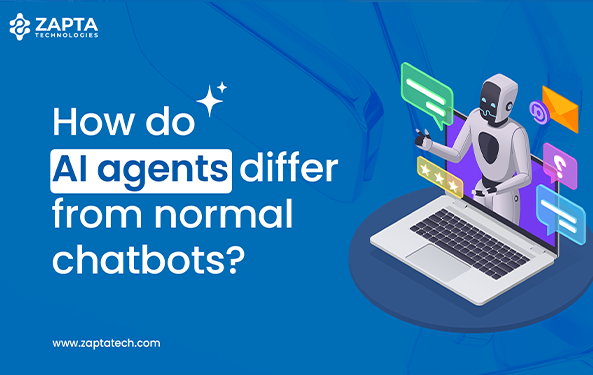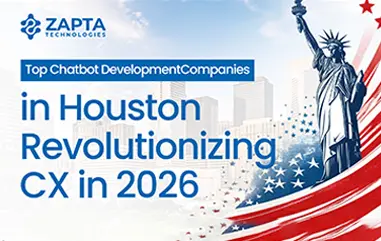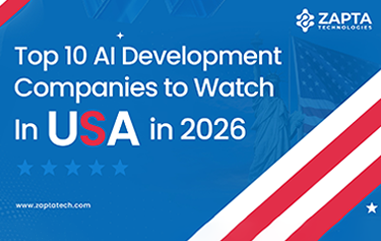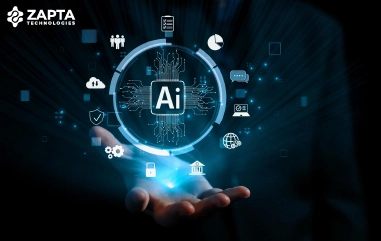The day a chatbot couldn’t process a refund, we knew it was cooked. Time to let an AI agent shine.
Yup, they’re both different.
How do AI agents differ from normal chatbots?
See, most of you still confuse chatbots with AI agents, and on the surface, it makes sense. Both chat with your customers, both seem “smart,” and both promise efficiency.
But here’s the difference: one just repeats what it’s programmed to say, while the other can actually understand, adapt, and solve problems.
You can’t be mixing the two, else you await frustrated customers, longer resolution times, and ROI that falls flat. That’s why companies investing in custom AI development in the USA are taking this distinction seriously.
Choosing the right technology, AI chatbots vs AI agents,, for a smooth customer experience is a decision that makes or breaks your growth.
What Is a Normal AI Chatbot in Business?
If you’re a chronic online shopper, you already know what a chatbot feels like. Almost every e-commerce platform offers one to answer quick questions about order processing, shipment, or delivery.
But for those who don’t know, a chatbot is often the first taste of automation that businesses try. It’s a kind of digital assistant that follows pre-written scripts or rules. You ask a question, and if the chatbot has a preloaded answer, it responds instantly. If not, it usually loops, stalls, or directs you to a human.
Where do these chatbots work best?
- Customer support FAQs: answering common questions like “What are your business hours?” or “How do I reset my password?”
- Order updates: giving delivery status, shipping confirmations, or payment alerts.
- Simple bookings: scheduling appointments, reserving tables, or checking availability.
In short, chatbots shine when the task is predictable and repetitive. They’re fast, cost-effective, and available 24/7, but they stop being helpful once the question goes beyond their script.
What Is an AI Agent and How Does It Work?
If you’ve ever wished a chatbot could actually remember your last conversation, or just handle the problem without passing you around, that’s what an AI agent does.
And chances are, you’ve already used one without even realizing it. Think Siri reminding you of a meeting, or Alexa ordering something with just a voice command, both are AI agents quietly making your life easier.
Unlike chatbots, which stick to scripts, AI agents can learn, reason, and act. They understand context, adapt to new situations, and make decisions that move the task forward.
Here’s the simple breakdown:
- They learn from data and past interactions.
- They reason by analyzing context instead of repeating the same reply.
- They act by taking the next step, resolving the issue, not just talking about it.
Where do AI agents help?
While most people experience AI agents through tools like Siri or Alexa, businesses are adopting the same technology in their internal workflows as well as in their products and services to boost efficiency and customer experience.
- Personalization: recommending the right product because they remember what you browsed last time.
- Workflow automation: processing refunds, handling claims, or routing tickets without human backup.
- Decision support: analyzing large datasets and offering insights that teams can act on.
In the U.S., custom AI agent deployments are already changing how healthcare runs. And, this is where things got real and brought a massive impact on the healthcare industry.
Ascertain, a New York–based startups, rolled out a custom AI agent for clinicians. And honestly? It’s like giving case managers a backstage assistant. Instead of drowning in endless notes, prior authorizations, and compliance checklists, they’ve got an agent quietly handling that grunt work.
The best part? Nurses and managers finally get to spend less time fighting with paperwork and more time actually caring for patients. That’s not just convenient in healthcare; you can bring the same impact to your business.
In short, an AI agent is like bringing a teammate who actually gets the boring things done, efficiently.
Chatbot or AI Agent: Which Should Your Business Choose?
This is where most decision-makers get stuck, do you really need an AI agent, or is a chatbot enough?
Here’s the breakdown:
Chatbots: great for repetitive, simple, cost-saving tasks. FAQs, order updates, or booking confirmations. If your business needs a quick, low-cost way to automate basic conversations, a chatbot gets the job done.
AI Agents: built for personalization, scaling, and automation-heavy needs. They respond, learn, reason, and act simultaneously. Perfect for businesses dealing with complex workflows, high-touch customer support, or data-driven decision-making.
Many companies start with chatbots because they’re easy to deploy. But as customer expectations rise and operations get more complex, most end up upgrading to AI agents. It depends on what fits your current stage and future goals.
At the end of the day, the difference is simple: chatbots are scripted responders, while AI agents are autonomous problem-solvers. One handles repetition, the other drives intelligence.
What should you choose? Choose based on empathy for your own journey: where your business stands today, and where you want it to be tomorrow.
And if you’re exploring custom AI development services in the USA, it might be worth starting with a discovery workshop with a custom AI development partner like ZAPTA Technologies.
Our approach is simple: strategy first, execution next. That’s how we help companies cut through the noise of off-the-shelf software and invest in AI systems that deliver real ROI, be it through an AI chatbot or a custom AI agent.

















